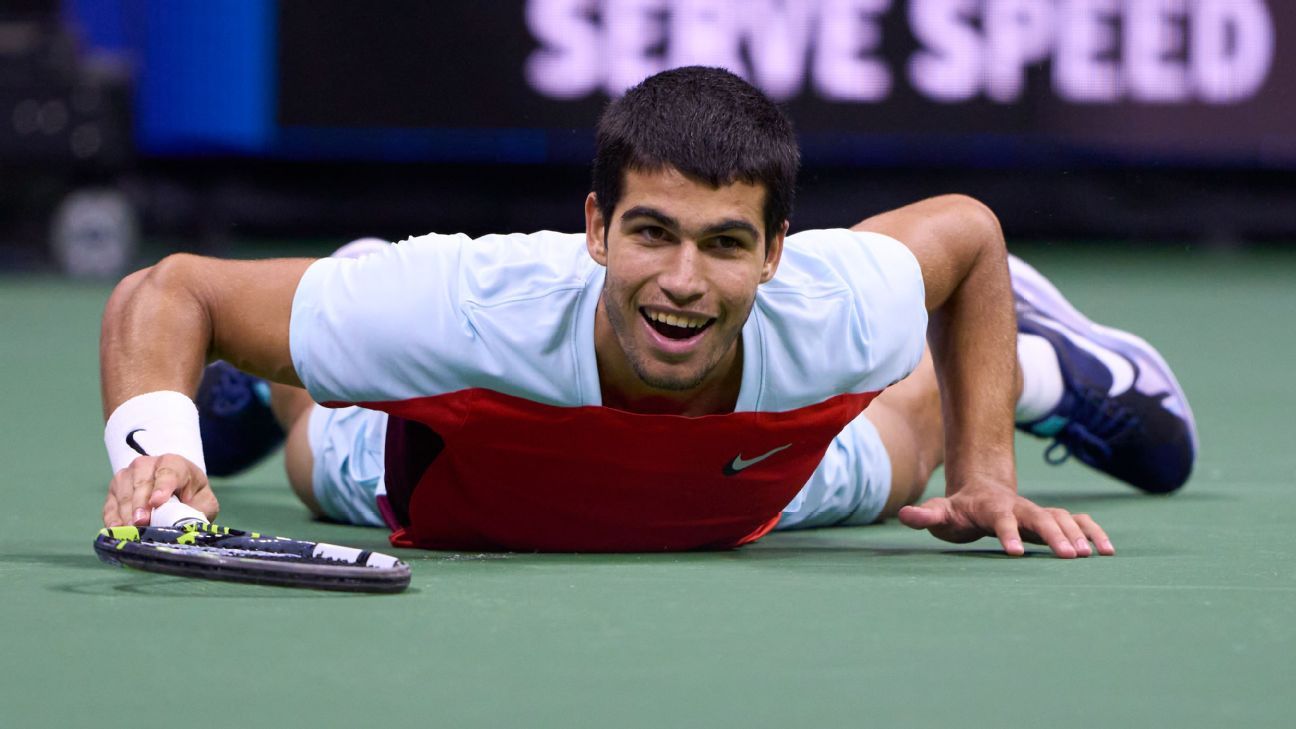NEW YORK — Carlos Alcaraz Lerma always told his grandson that to win tennis matches and to become the best player in the world, it would take “head, heart and courage.”
And in the course of the US Open men’s singles final on Sunday, Carlos Alcaraz had to draw on those three to get past the valiant Casper Ruud 6-4, 2-6, 7-6 (1), 6-3.
With this victory, Alcaraz, 19, will become the first teenager to reach world No. 1 since the ATP rankings began in 1973.
It seems he’s just getting started — and he’s going to leave an indelible mark in this sport.
“This is something I’ve dreamed of since I was a kid — to be number one in the world, and champion of a Grand Slam is something I’ve worked really hard for,” Alcaraz said on court afterwards.
There were times during this final — mostly at the end of the second set — where Alcaraz looked flat. The triple-header of five-set matches leading up to this match looked to have taken their toll.
Towards the end of the third set, it looked like Ruud’s pinpoint accuracy could tip the balance in the favor of the Norwegian. But then Alcaraz — just like he’s done repeatedly here — found another level, won a remarkable point to take the set to a tiebreak and then blew Ruud away in that, 7-1.
The tide had turned, Alcaraz harnessed the energy of the crowd and it got him over the line in the fourth. Those heavy legs were light again, and Alcaraz was making the sorts of heavenly shots we’ve become accustomed to.
Alcaraz has the ability to make the unbelievable look almost normal. With all the snapping forehands, beautiful lobs and cutting volleys at the net, you have an eye-catching superstar who has the potential to be a mainstay in Grand Slam finals for the next 15 years.
When you look at certain shots from the past fortnight — like that behind-the-back shot against Jannik Sinner, and that point against Frances Tiafoe to take it to a first-set tiebreak where he somehow hit a forehand winner down the line from a ridiculous position of peril — Alcaraz has this ability to take all those watching completely into the moment, leaving jaws on the floor and arms involuntarily outstretched. That’s special.
The Spaniard was the heavy favorite for this final. And he delivered on the hype.
But that takes nothing away from Ruud, who threw everything at Alcaraz. His time will come in a Grand Slam. Having won just six games in his defeat to Rafael Nadal in the final at Roland Garros, Ruud was far more settled against Alcaraz. But despite his brilliant play, Alcaraz just had that little bit more.
Alcaraz won this because he managed to stay in front at the key match-turning moments. For so often this tournament we’ve seen Alcaraz stretch for returns and they’d just drop in. But not today: He couldn’t rely on those moments of tennis fortune. So to win this, Alcaraz had to win the arm-wrestle and peak at the right moments.
This victory also came off the back of a marathon week for Alcaraz. By the time he won Sunday night, he had spent longer on court than any other player during a major tournament since 2000. To get to the final, he had to defeat Marin Cilic and Sinner, which both went the distance and finished at 2:23 a.m and 2:50 a.m, respectively. Then Alcaraz’s semifinal win over Tiafoe also went five sets, and lasted 4 hours and 19 minutes.
Alcaraz knew that if Sunday’s match went five, he had already been there and done that three times this week. Afterwards he was asked if he was tired.
“A little bit,” he said. “But there’s no time to be tired in the final run of a Grand Slam — you have to give everything on court and everything you have inside. It’s something I’ve worked hard for.”
And though his sleep pattern must’ve been disastrous, he rarely looked rattled. There were very few moments where his focus dissolved into frustration on court.
Some of that is down to him, but it’s also in part to the team around him. In the final game as Alcaraz was serving for the title, he went 30-0 up. Those in his box were starting to get excited. Alcaraz’s coach Juan Carlos Ferrero gestured for them all to calm down. Even with victory within touching distance, nothing was certain until it was done.
A couple of minutes later, Alcaraz was on the floor overwhelmed with emotion after winning the title. He then clambered through the crowd to get up and greet his team.
“All of the top decisions are with my parents and team — it’s really special for me,” Alcaraz said after. Then he climbed back down again, and as he sat back down, the tears flowed again through the smile. He said later that he was thinking of his mother Virginia and grandfather who couldn’t make the final.
This win should be ominous for his competitors. He was the youngest winner here since Pete Sampras back in 1990, and that proved to be the first of 14 singles titles. Alcaraz has the ability and temperament to do something similar.
For so long, we were worried about what the future of men’s tennis would look like in the post-Roger Federer, Nadal, Novak Djokovic era. Well, worry no longer. It’s in safe hands, and it’s built on head, heart and courage.
